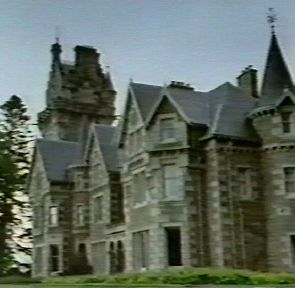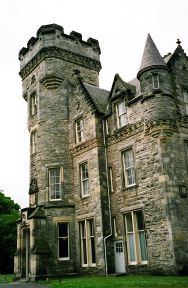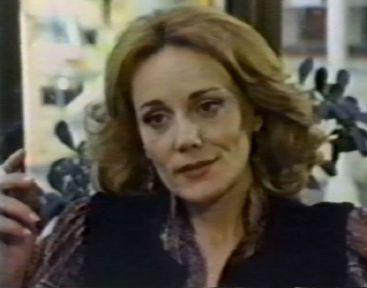


The Dark Side of the Sun (1983)
(IMDb review)
The Dark Side of the Sun (1983)
(IMDb review)
Templar + Temptation = Trouble
Templar + Temptation = Trouble
I have fond memories of watching this BBC fantasy thriller serial in the TV room in University Hall in my first term at St As. It became something of a cult, especially among mediæval history students with warped senses of humour. I had a good deal of fun sneaking around Hepburn Hall with my 'academic mother' Sophie, blutacking red-painted demon heads (xeroxed from the cover of a David Munrow album, Music of the Gothic Era) on to the doors of my 'academic brothers'' rooms, and they sent us mysterious letters from the secret order of the "Priors of Hepburn", with wax seals made with somebody's rosary! I also wrote a humorous fanfic in letters to a former schoolfriend. Our escapades stemmed from the resemblance of the Scottish castle in the last episode to Wardlaw Wing; the fact that a middle-aged couple who lived near Hepburn had a Mercedes similar to the one in the serial (we nicknamed them "the von Reitzes"); and the Mediæval History Department incorporating a building which had belonged to the Hospitallers and previously to the Templars (albeit only as a source of rent). There was at that time also a much battered stone head (now almost totally eroded) in Baxter's Wynd (aka Baker Lane), which had attracted some myths.
 |
 |
The Scottish Castle |
Wardlaw Wing, University Hall |
I've already written a normal(ish) review on IMDb. Here I want to explore in more detail some background issues and the plot-holes down which I (like a middle-aged Alice) am following my own plot-bunnies, particularly in anchoring the story to a more plausible historical context. I felt strongly that the mediæval back-story should have been more morally complex, as this would have given greater depth and texture to the present-day adventure.
It's impossible to watch Dark Side without being aware of when it was made, in terms of its underlying preoccupations. Following a string of TV programmes by Henry Lincoln, The Holy Blood and the Holy Grail (which later influenced The Da Vinci Code) had been published in 1982. These had launched into popular culture the French hoax of the so-called Priory of Sion, which its creators had linked to ancient royal dynasties, Knights Templar, Catharism, and various other secrets. Underpinning all was the notion of a powerful secret society, linked to the Templars and Freemasonry, which (for good or ill, depending on one's point-of-view) acted as a 'hidden hand' in history. Also in 1982, the Calvi murder aroused suspicions about the Mafia, the P2 Lodge, and Vatican finances. The modern thriller element of the plot draws heavily on these conspiracy theories, as it postulates the existence of a secret Brotherhood of powerful men – politicians, financiers, industrialists, soon also a cardinal – secretly pulling the world's strings, and links them with a continuation of the Knights Templar.
The romantic side of the story is pure Gothic, of a kind Anne Radcliffe would have recognised (is it more than coincidence that the heroine is called Anne?). Exotic location? – Yes. (These were the days before drunken young British clubbers had invaded the Greek islands.) Mysterious and picturesque castle? – Yes. A wilting damsel-in-distress? – Yes. Insipid male juvenile lead – Yes. A handsome but sinister and murderous aristocrat with dubious sexual intentions towards the damsel? – Yes. Secret society with fancy robes? – Yes. There are particularly strong overtones of Dracula. The Jonathan Harker role is split between Don Tierney (until he is killed) and David Bascombe. Anne Tierney is both Lucy and Mina, but more passive victim than active heroine. What is interesting is that the van Helsing role is taken by a woman, the erudite and elegant Dr Ismini Christoyannis, psychiatrist and psychic: for me, she is the real heroine, although we don't get to meet her until episode 3. She realises before Anne and David whom/what they are fighting, and is the one person who can resist his psychic powers with her own. It's refreshing to see a popular TV serial depict a female character who is intelligent, capable and glamorous. As villain or anti-hero, Raoul Lavallière/Thibaut de Montrefort has the traditional characteristics of the aristocratic vampire, without actually being one (except, perhaps, at a psychic level): ruthlessness, cynicism, sophistication, an incubus-type sex-life, and the melancholy charm that always seems to accompany immortality in such stories. He also looks delightfully soigné in white-tie. (In contrast, the undead vrykolakas of traditional Greek folklore is a far more uncouth creature.) I wanted to know more about what he's been doing for 700 years; how living so long, without ageing, in a changing world, has affected him. Did he really kill his mistress, Agnès, in cold blood because of a prophecy? We only know of this from the Hospitaller accounts David finds. The fact that, after 700 years, he still keeps her portrait on his desk, cherishes her necklace, and risks all his schemes to seduce by magic/hypnosis a modern woman who resembles her, raises some doubts on psychological grounds: it's more as if he has never got over her death. His dread of making a woman pregnant could easily stem from some tragedy in childbirth, common enough in those days. One also assumes that he took vows after her death: Templar discipline was stricter than that of the Hospitallers, and unchastity was punishable by loss of habit. He is appallingly duplicitous with Anne, but he only tries to harm her physically when she tries to stab him. I am not convinced by the 'curse' story: he does seem on the point of collapse at the end, but why? He has seen Anne's medical records, so must know her 'pregnancy' is physically impossible. It's a conspicuous plot-hole/breakdown in narrative logic. It's also unfortunate that he is so fixated on Anne's resemblance to his dead mistress, when Ismini would make the ideal poised and accomplished châtelaine!
 |
 |
Raoul and Ismini = OTP! |
|
Call it professional pride, but as a historian, I feel I must say a few words about David: he's a highly unprofessional little drip. I do not trust his research methods and his judgement. I cannot believe he is a lecturer from Durham (a respected university that was third on my UCCA form in the dim and distant past) on sabbatical, but suspect he's a research student who exaggerates his qualifications to get access to material. The military orders are not his subject: he's a Byzantinist who also dabbles in Ancient Greek history. Nevertheless, he makes bold assertions based on limited sources, without questioning their authors' agenda. He takes at face-value Brother Philibert's not-very-secret 'secret account' of Thibaut's murderous past and the massacre at Saint-Theodore/Hagios Theodoros. Yet he knows that the Hospitallers wanted to regain the castle from the Templar refugees, and he has not had time to check the information against other records. And even allowing for his ignorance of Raoul's real identity, it's just crass bad manners (motivated in part by jealousy) to trot out all the accusations against his 'ancestor' while a guest at his party. "Kill him. Now. Please!" was the response chez nous. The boy is a Darwin Award contender! I wondered at Ismini (who seems to be implied to be his former lover – well, I daresay everyone has their moment of foolishness!) letting him take the role he did in the séance: was there not a risk that his own emotions re: Anne might interfere? I raised an eyebrow at his logic in describing the Brotherhood as "a neo-Nazi Freemasonry modelled on the Knights Templar", given that a British industrialist called Sir Joseph Marcus (surely Jewish) is a member.
I find the Templar-based historical back-story disturbing, and not for horror reasons. At around the same time I first saw Dark Side, I first read Barber's The Trial of the Templars: I wept over it. Even in a fantasy context, the presumption of their guilt makes me morally uneasy. Dark Side endorses the charges of devil-worship, and particularly the 'demonic heads'. In fact, these were nothing more sinister than silver-gilt reliquary heads, allegedly of St Euphemia and one of St Ursula's attendant virgins. David suggests that Thibaut and his companions fled to the East from France at the time of the first Templar arrests there in 1307. However, since he would have been a young knight at the time, it is more likely that he was already based in Cyprus, the front line after the fall of Outremer: most of the personnel in the West were either old or very young, or were admin, rather than fighters. Whether he joined in France or in Cyprus, we do not know. The arrests in Cyprus began in 1308, and the first trial there (without torture) took place in 1310-11. The Templars seem to have proved their innocence, with support from many non-Templar witnesses. However, the Pope ordered a second trial, this time with torture, to get the result he wanted. We know that some, including the Marshal, were re-arrested and died in prison, although this may have been connected to a plot against the king, Henri II de Lusignan. Otherwise, we do not know what became of most of the Cyprus Templars after the trial: this provides a hole in the historical record into which the fictional story can easily fit. The Templars' properties were handed over to the Hospital in 1312, and certainly elsewhere, a lot of Templar personnel simply came under the the supervision of the Hospitallers or other monastic orders (although they were not allowed to change order). The idea of former Templars from Cyprus resurfacing among the Hospitallers on Rhodes would make sense in this context.
The plot-thread about the murder of Thibaut and his fugitive fellow knights by the Hospitallers seems to be based on the real deposition of the Hospitaller Grand Master, Folco de Villaret. In 1317, de Villaret's arbitrary rule and financial mismanagement prompted his own order to try to assassinate him at his country residence in Rhodini. He then fled to Lindos, where they besieged him, having elected a replacement Master. The dispute was referred to the Pope, and in 1319, he was forced to resign formally. He died at his sister's home in France, several years later. The names 'de Villaret' and 'Lavallière' have a similar pattern of consonants, and Lindos was one of the castles used in filming to represent Raoul/Thibaut's home at Saint-Theodore. However, given the date, the Hospitaller Grand Master with whom Thibaut has dealings, and who arranges his murder in 1317, must be de Villaret himself. We know that in reality, there were long-standing animosities between the orders, exacerbated by Cypriot dynastic politics. In the Dark Side universe, Hospitaller relatives of Agnès are implied to have stirred up trouble (perhaps this is when the accusation about her death arises?) and the heresy/devil-worshipping allegations are revived against the former Templars. Could the Saint-Theodore massacre be a factor in de Villaret's overthrow, an example of his 'tyranny'? Is Brother Philibert's not-very-well-concealed 'secret' narrative about it part of the Hospitaller politicking in their revolt against him? Again, the fictional narrative can be tweaked into the real history with little difficulty.
As it stands, Dark Side is an enjoyable fantasy thriller, but I think greater moral ambiguity could have made it stronger: few people or things are as black-and-white as the Gonfanon Bauçant, and the real-life tragedy that overshadows the story could have been handled with more poignancy than sensationalism. Raoul's cynicism and manipulativeness, his belief that compassion and mercy are weaknesses, have greater force if one considers the possibility that he was an innocent man (as were the rest of his order) embittered by monstrous injustice in his first lifetime, and through centuries of observing the world since. Surviving the Inquisition (probably with at least a couple of years in prison during the trial, perhaps with torture) and then being 'murdered' treacherously on de Villaret's orders would be enough to make anyone cynical and paranoid for a few hundred years! Nothing a good psychiatrist couldn't handle… ;-D
My fanfic sequel to the serial is here on fanfiction.net:
Survivors
The PDF version, and more information on the serial and other works by the same writer, may be found on David Rice's site:
Back to
TOP

